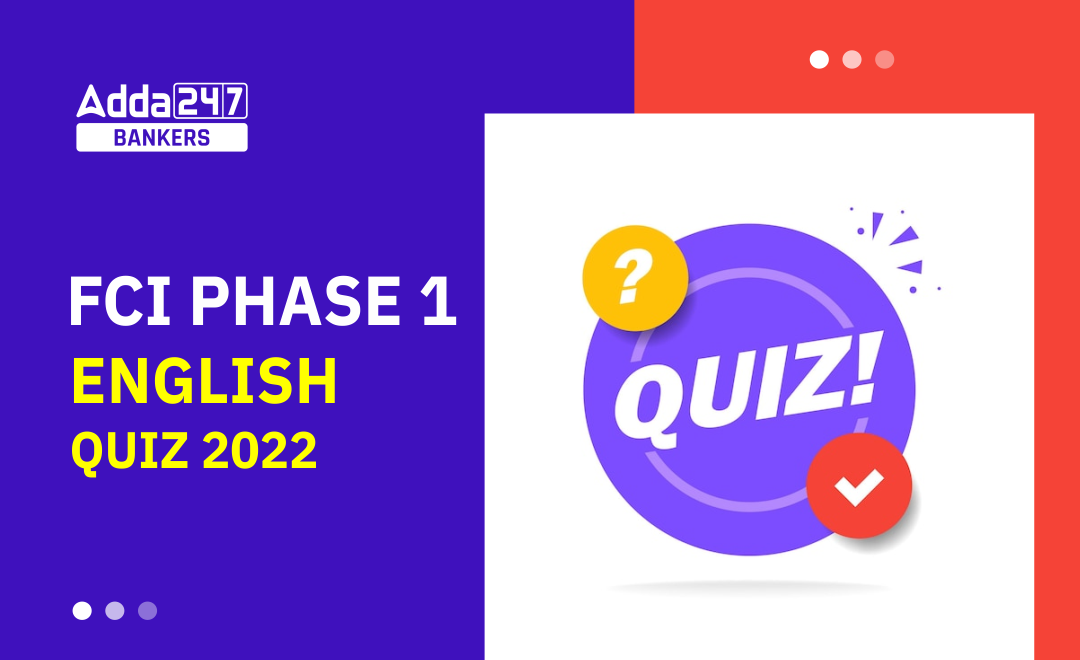Directions (1-5): Read each sentence to find out whether there is any grammatical or idiomatic error in it. The error, if any, will be in one part of the sentence. The number of that part is the answer. If there is ‘No error’, the answer is (e). (Ignore errors of punctuation, if any.)
Q1. Festivals are prime occasions (a)/ for spluring on presents and owing to improved economic situation (b)/ the youths is gung-ho (c)/ about breaking all previous records. (d)/ no error. (e)
Q2. It is important to recruit personnel at (a)/ different levels in the organization so that (b)/ ensuing human resource gap is bridged (c)/ at least for the critical operations. (d)/ No error. (e)
Q3. Not only has the commerce ministry fixed (a)/ extraordinarily minimum prices for onion exports (b)/ but it has also made licencesmandatory (c)/ for every consignment. (d)/ No error. (e)
Q4. Mother tongue is as natural (a)/ for the development of man’s mind (b)/ as mother’s milk is (c)/ for the development of the infant’s body. (d)/ No error. (e)
Q5. A small piece (a)/ of bread is (b)/ certainly better than (c)/ being nothing to eat. (d)/ No error. (e)
Q6. The number of students (a)/ completing in the event (b)/ has been fallen (c)/ because of want of incentive. (d)/ No error. (e)
Q7. Some of the more best (a)/ preserved pre- Columbian chiff (b)/ dwelling in the United States (c)/ are located in Mesa Verde National Park in Colorado. (d)/ No error. (e)
Q8. A ray of light passing through (a)/ the centre (b)/of a thin lens keep (c)/ its original direction. (d)/ No error. (e)
Q9. Both (a)/ the structure or (b)/ the chemical composition of (c)/ lamellae are complex. (d)/ no error. (e)
Q10. None of us have (a)/ seen him in the club (b)/ since he got married (c)/ two months back. (d)/ no error. (e)
Directions (11-15): Rearrange the following sentences (A), (B), (C), (D), (E) and (F) in the proper sequence to form a meaningful paragraph; then answer the questions given below them.
(A) The Australian this week became the first player ever to be penalized for mock fielding, in a local match.
(B) The batsman was confused for a moment, stopped in his tracks, and then completed the run.
(C) The umpire awarded the batsman five runs for “deliberate distraction, deception or obstruction of a batsman”.
(D) Connoisseurs of cricketing trivia would do well to remember the name MarnusLabuschagne.
(E) This trick is a common one in Indian club cricket, especially when there is overgrown grass in the monsoon.
(F) Labuschagne dived to stop a cover drive that went past him, quickly got up and pretended to throw the ball that he did not actually have in his hands.
Q11. Which of the following should be the first sentence after rearrangement?
(a) B
(b) D
(c) A
(d) F
(e) C
Q12. Which of the following should be the third sentence after rearrangement?
(a) A
(b) D
(c) F
(d) E
(e) C
Q13. Which of the following should be the fourth sentence after rearrangement?
(a) B
(b) E
(c) F
(d) C
(e) D
Q14. Which of the following should be the last sentence after rearrangement?
(a) D
(b) E
(c) A
(d) B
(e) C
Q15. Which of the following should be the second sentence after rearrangement?
(a) C
(b) A
(c) B
(d) D
(e) E
Solutions
S1. Ans. (c)
Sol. Use ‘are’ in place of ‘is’ because the subject of the verb ‘the youths’ is plural.
S2. Ans. (e)
Sol. The sentence is grammatically correct.
S3. Ans. (b)
Sol. Use ‘price’ in place of ‘prices’ as ‘onion’ is a thing, for which ‘price’ in singular form is used.
S4. Ans. (e)
Sol. The sentence is grammatically correct.
S5. Ans. (d)
Sol. The use of ‘being’ is superfluous.
S6. Ans. (c)
Sol. ‘has fallen’ will be used in place of ‘has been fallen’ as ‘fall’ is an intransitive verb for which there is no passive voice.
S7. Ans. (a)
Sol. The use of ‘more’ is superfluous as ‘more’ and ‘most’ is not used before comparative degree or superlative degree.
S8. Ans. (c)
Sol. ‘keeps’ will be used in place of ‘keep’ as the subject of the sentence ‘A ray’ is singular.
S9. Ans. (b)
Sol. ‘and’ will be used in place of ‘or’ as conjunction ‘and’ is used after ‘both’.
S10. Ans. (e)
Sol. The sentence is grammatically correct.
S11. Ans. (b)
Sol. The sequence after rearrangement of the sentences is DAFBEC
S12. Ans. (c)
Sol. The sequence after rearrangement of the sentences is DAFBEC
S13. Ans. (a)
Sol. The sequence after rearrangement of the sentences is DAFBEC
S14. Ans. (e)
Sol. The sequence after rearrangement of the sentences is DAFBEC
S15. Ans. (b)
Sol. The sequence after rearrangement of the sentences is DAFBEC





 RBI Assistant Preparation Strategy for B...
RBI Assistant Preparation Strategy for B...
 BPSC TRE 4 Notification 2026: मार्च में ...
BPSC TRE 4 Notification 2026: मार्च में ...
 BPSC Auditor Recruitment 2026: ऑडिटर के ...
BPSC Auditor Recruitment 2026: ऑडिटर के ...










